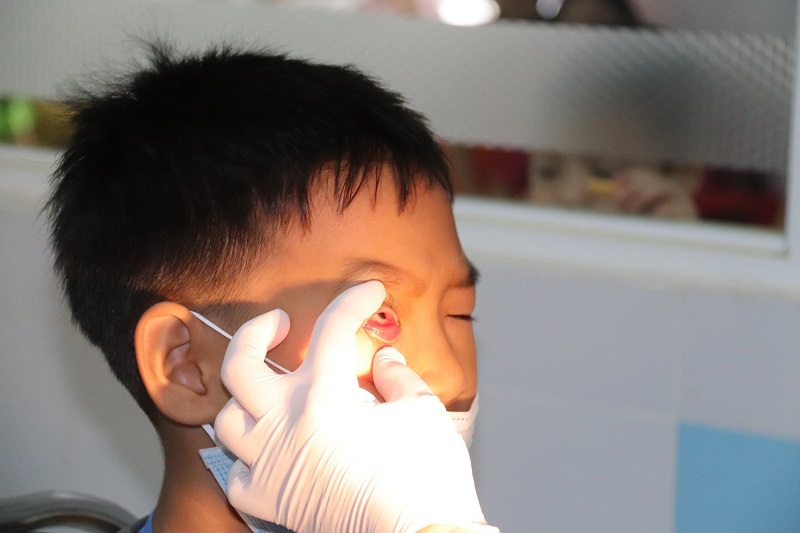Pink eye (conjunctivitis) is a common condition caused by viruses that can easily spread and become an outbreak. Proper care involves not only treating the symptoms but also preventing its spread. Below are detailed measures for symptom management, dietary recommendations, and effective prevention strategies for pink eye to help care for pink eye patients effectively.
1. Symptom Management and Infection Prevention
Currently, there is no specific treatment for viral pink eye. The symptoms usually resolve on their own within 7-10 days. If the condition persists for 2-3 weeks, it’s advisable to see a doctor to avoid serious complications. When you care for pink eye patients, managing symptoms and preventing the infection’s spread are paramount.
Symptom Management:
– Patients should clean their eyes daily and use saline solution or distilled water to rinse them.
– For pink eyes with swelling and redness, applying a clean cold compress can help alleviate discomfort.
– When going outside, wearing dark sunglasses can reduce light sensitivity and prevent the urge to touch the eyes.

Sterilized gloves should be worn when touching the eyes of a person with pink eye.
Infection Prevention:
– Use a single-use wet cloth for each eye and discard it after use.
– Avoid sharing face towels with others.
– Resist touching the eyes. If you do touch them, wash your hands immediately with soap.
– Wash hands before and after eating, and after sneezing or coughing.
– Avoid wearing makeup until the infection clears.
– Do not use contact lenses until the conjunctivitis is completely gone.
– Caregivers should wear sterile gloves when cleaning the patient’s eyes and wash their hands thoroughly with soap after contact with the patient.
To care for pink eye patients, it is crucial to maintain strict hygiene practices to minimize the risk of spreading the infection to others.
2. Dietary Recommendations for Pink Eye
Foods to Eat:
– Vitamin A: Essential for producing pigments in the retina, aiding in low-light vision, and maintaining healthy conjunctiva and cornea. Found in bell peppers, fish liver oil, butter, black-eyed peas, carrots, pumpkin, and animal liver.
– DHA and EPA: Critical for retinal health, these omega-3 fatty acids are found in high concentrations in salmon and flaxseeds.
– Zinc: Plays a vital role in pigment formation in the retina and reducing conjunctival inflammation. Available in nuts, shrimp, crab, oysters, beans, and milk.
– Vitamins C and E: Natural antioxidants that help prevent infections and promote healing. Rich sources include oranges, grapefruits, strawberries, lemons, and mangoes.
– Water: Essential for overall health and maintaining eye moisture. Drink at least 2 liters of water daily to keep the eyes hydrated.

Some foods containing vitamin A are good for the eyes.
Foods to Avoid:
– High-sodium fast foods: Can lead to dehydration and exacerbate dry eyes.
– Water spinach: May increase eye discharge, leading to infections and delayed recovery.
– Animal fats: Saturated fats can increase blood lipid levels, worsening inflammation.
– Spicy foods: Can cause eye irritation and prolong pink eye symptoms.
– Seafood: If you have allergies, seafood can exacerbate eye issues.
– Sugary drinks, stimulants, and preservatives: Can increase eye discharge and irritate the optic nerves.
Understanding the appropriate diet is part of how you care for pink eye patients, ensuring they receive the necessary nutrients to support recovery while avoiding foods that could worsen their condition.

The use of stimulants should be limited when the eyes are inflamed.
3. Eye Protection Tips
To maintain eye health and prevent pink eye and other eye diseases, consider adopting the following habits:
– Ensure 8 hours of sleep each night to avoid overworking the eyes.
– Avoid smoking and exposure to secondhand smoke, as tobacco smoke can worsen eye symptoms.
– Protect your eyes from the sun’s harmful UV rays by wearing sunglasses.
– During pink eye outbreaks, avoid contact with infected areas and refrain from swimming in infected pools where the virus can thrive.
– Do not self-medicate with eye drops containing corticosteroids or unknown substances, as some ingredients can worsen pink eye damage.
– Consult a doctor if you experience persistent redness, pain, blurred vision, or discomfort when exposed to bright light.
These guidelines offer comprehensive care for pink eye patients while preventing the spread of infection. At Thu Cuc TCI, our ophthalmology specialists, with over 30 years of experience, utilize modern medical equipment to effectively diagnose and treat pink eye and other eye conditions. Contact us today to schedule an appointment and take advantage of our exceptional offers!
By following these steps, you can ensure you properly care for pink eye patients, promoting their recovery and preventing the spread of this highly contagious condition.








